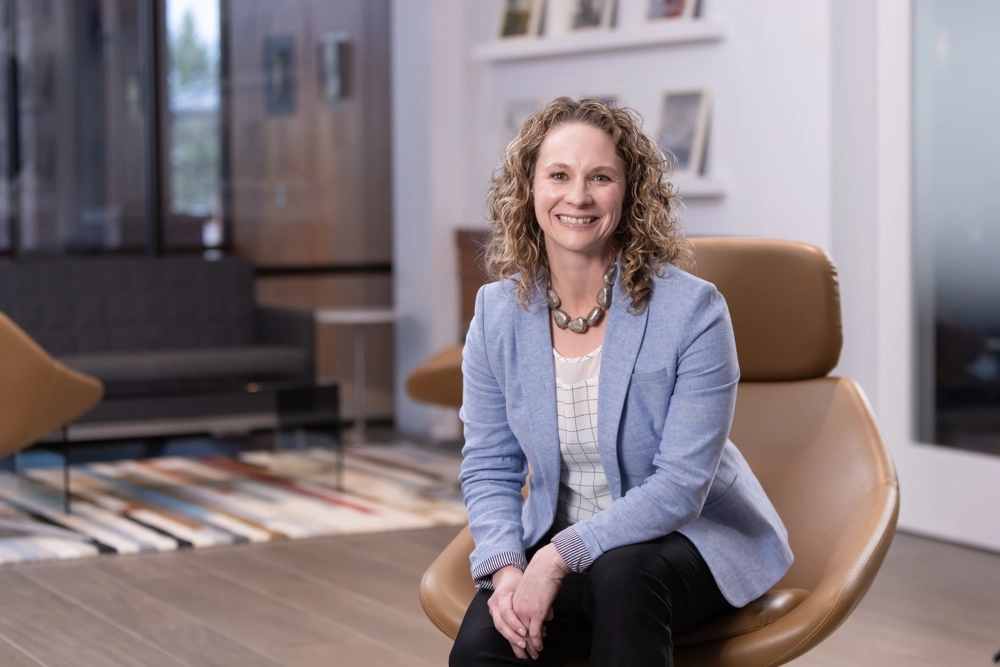Constructing Careers, Breaking Barriers
Two women at various stages of their career in construction share their experiences.

We're recognizing women throughout the month of March for Women's History Month, Women in Construction Week and International Women's Day.
The experience of women in construction has evolved over the years, which can be evidenced by our own team members at various stages of their own careers. Read our Q&A below to hear about their experiences.
Meet the Experts
Beth Duyvejonck, Regional Vice President of Construction in Minneapolis, has been engaged in design-build project management since 1997.
Megan Garner, Project Executive in Kansas City, began her career with us right after graduating from Marquette University in 2012.
Q&A
Why did you choose a career in construction?
Megan: My dad is an architect who did a lot of project management during his career. I was in high school when it started to pique my interest, and I saw that my organizational skills and attention to detail would be well applied to a career in construction project management.
Beth: I had zero exposure to construction or project management as a career option until college. I have a “math brain" and was destined to be an engineer. I also have high spatial ability, which I thought at the time would only benefit me in playing Tetris and packing a suitcase! It wasn't until my freshman year at Iowa State University during an Intro course that I learned about Construction Engineering and immediately changed my engineering degree focus. I have been obsessed with building ever since.
What was your early experience in construction like? How have things changed?
Megan: Early in my career I was definitely more of a fly on the wall, absorbing and learning as much as I could. I eventually found my voice and my confidence increased dramatically.
Beth: I absolutely love to hear Megan's stories! My early career in construction looked a lot different than today.
As a Construction Engineering student and co-op (not at Opus) in the mid 1990s, I was encouraged to change my degree and career aspirations to find something that would be more appropriate for my “feminine leadership style." That is a direct quote used by a co-op supervisor and Construction Engineering advisor. When I started at Opus in 1997, it was still common practice to have tool girl pin-up calendars in jobsite offices where I was leading meetings.
Megan: Wow, this makes me cringe so much! I'm so happy that this has not been my experience, and that there has clearly been progress in the industry since then.
Beth: One of the first acts of advocacy I experienced in my career was the superintendents who made sure those were removed! Even with those speedbumps, I experienced early that the Opus culture respects talent. I was able to work with some incredible teams and find ways to provide value. Once I found and strengthened my network inside Opus – many of whom I still have the privilege of working with – I began to experience the power of trust and collaboration.
Let's talk intersectionality of age/career stage with being a woman in construction. What was/is it like to be young and a woman in construction? Do you think you experienced discounting more due to your age and gender?
Megan: Looking back at that time, I can recall feeling constantly unsure of myself and wondering if I had what it takes to be successful in this industry. During that time, I did not feel that I had really experienced any age or gender bias, but when I reflect back, I can see that it was there.
Beth: Same here!
When was your experience truly considered and valued?
Megan: I would say that came when I had the opportunity to manage projects, or parts of projects, on my own. That was probably a good four to five years into my career.
Beth: Managing scopes and projects independently was also a confidence-builder for me. Finding my voice took some time. It might be hard to believe now, but I was incredibly shy as a student and as a young project manager. It took both confidence and practice to get my voice in the mix. The more I heard from others that my contributions were important, the louder I was willing to raise my voice to get my ideas on the table. I'm grateful for everyone who encouraged me, and I try really hard to make that space for all of the great ideas that might not be getting heard now.
Beth, your career and life have changed and grown – you're a Wife and Mom of two girls and in company leadership. Tell us about your experiences with both. Have those identities intersected?
Beth: Oh definitely! The intersection of parenting and career development is an incredibly challenging and exhausting transition for all new parents. Adding to that are the physical demands of pregnancy and pumping (for nursing moms) while navigating a construction jobsite. I have a favorite example of advocacy from our field team when I was conducting a safety walk of the University of St. Thomas Athletic & Rec project while nine months pregnant. The superintendent had preplanned a safety walk that would be accessible to me, and I can remember being so appreciative of his efforts. Our industry is starting to understand and improve conditions for women on our sites – which is needed to retain women through all phases of life and career.
Have you experienced male allyship in your career? Tell us about that.
Megan: Yes, definitely. The male allyship I have experienced in my career is certainly not limited to this, but the most prominent and influential example for me has been the male superintendents that I have worked with at Opus. It is one thing to have credibility on the project management/office side of our construction business, but what these gentlemen did for me is establish credibility with the field personnel. They would ask for my opinion in meetings and encourage my participation in field decisions. Some of those individuals include Al Budenski, John Kayser and Brian Eckart. I am very thankful for them!
Beth: I can't help but notice that so many advocacy examples come from our field team, and I think this is incredibly meaningful. 26 years ago, no one was referring to it as advocacy. At the time, I just thought of it as good teamwork and leadership. I never doubted that my team had my back. My team and managers ensured that I had opportunities and that my credibility was understood. I've had an all-star list of managers – Oscar Healy, John Williams and Tom Becker – and I have always been confident that my boss was speaking up for me in the rooms and at the tables where I was not yet invited.
Retention rates for women in construction are low. What keeps you in the industry? What do you think the industry needs to do to increase retention of women?
Megan: What first and foremost keeps me in the construction industry is simple – I love it.
Beth: Yes – it grabs you and does not let go!
Megan: I find it so satisfying to see a project come to life and to have such a tangible reminder of my hard work. Increasing the retention of women in the industry requires creating safe spaces for them. That requires diligence from all genders to be on the lookout for biased behavior (both conscious and unconscious), having the courage to call it out and adequately addressing it.
Beth: Construction is an incredibly rewarding career. I love the work and I love the people! Megan's comments are spot-on; I can't say it any better and won't try.
Megan: I will add that I've been extremely fortunate to have Beth as a mentor. It's so valuable to have her as a resource and sounding board during my career, especially when I'm struggling. Her validation of my experience as a woman in construction has been priceless. Hopefully I can provide that to others someday!
What advice do you have for women considering a career in construction?
Megan: We certainly need more women in construction! I would encourage them not to be intimidated by the low percentage of women in the industry (easier said than done, certainly) and to identify mentors and advocates early – male and female.
Beth: My advice for women considering construction is to follow your aspirations and find a company that supports your success. The industry needs you!
Article Type: Blog Post
Topics: DEI


